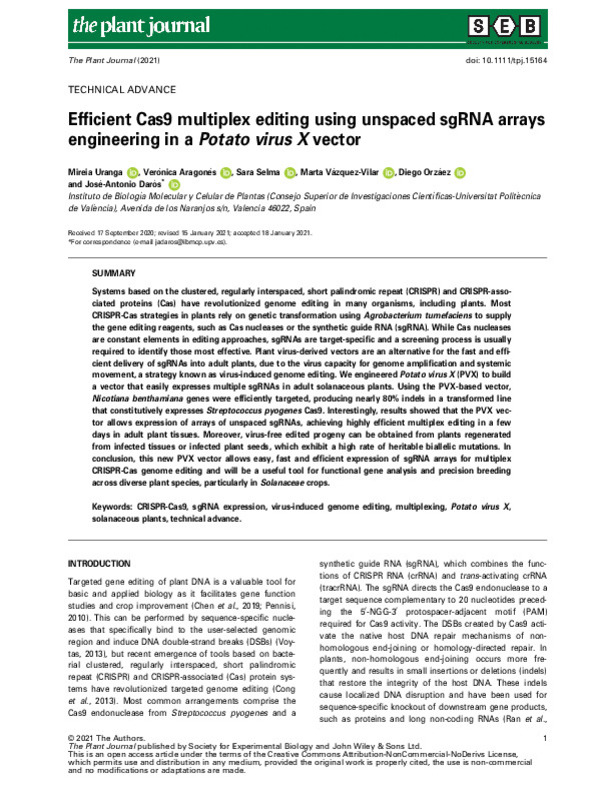JavaScript is disabled for your browser. Some features of this site may not work without it.
Buscar en RiuNet
Listar
Mi cuenta
Estadísticas
Ayuda RiuNet
Admin. UPV
Efficient Cas9 multiplex editing using unspaced sgRNA arrays engineering in a Potato virus X vector
Mostrar el registro completo del ítem
Uranga-Ruiz De Eguino, M.; Aragones, V.; Selma García, S.; Vázquez-Vilar, M.; Orzáez Calatayud, DV.; Daròs, J. (2021). Efficient Cas9 multiplex editing using unspaced sgRNA arrays engineering in a Potato virus X vector. The Plant Journal. 106(2):555-565. https://doi.org/10.1111/tpj.15164
Por favor, use este identificador para citar o enlazar este ítem: http://hdl.handle.net/10251/183588
Ficheros en el ítem
Metadatos del ítem
| Título: | Efficient Cas9 multiplex editing using unspaced sgRNA arrays engineering in a Potato virus X vector | |
| Autor: | Uranga-Ruiz De Eguino, Mireia Selma García, Sara Vázquez-Vilar, Marta | |
| Entidad UPV: |
|
|
| Fecha difusión: |
|
|
| Resumen: |
[EN] Systems based on the clustered, regularly interspaced, short palindromic repeat (CRISPR) and CRISPR-associated proteins (Cas) have revolutionized genome editing in many organisms, including plants. Most CRISPR-Cas ...[+]
|
|
| Palabras clave: |
|
|
| Derechos de uso: | Reconocimiento - No comercial - Sin obra derivada (by-nc-nd) | |
| Fuente: |
|
|
| DOI: |
|
|
| Editorial: |
|
|
| Versión del editor: | https://doi.org/10.1111/tpj.15164 | |
| Código del Proyecto: |
|
|
| Agradecimientos: |
This work was supported by grants BIO2017-83184-R and PID2019-108203RB-I00 from Ministerio de Ciencia e Innovacion (Spain) through the Agencia Estatal de Investigacion (co-financed European Regional Development Fund), and ...[+]
|
|
| Tipo: |
|









